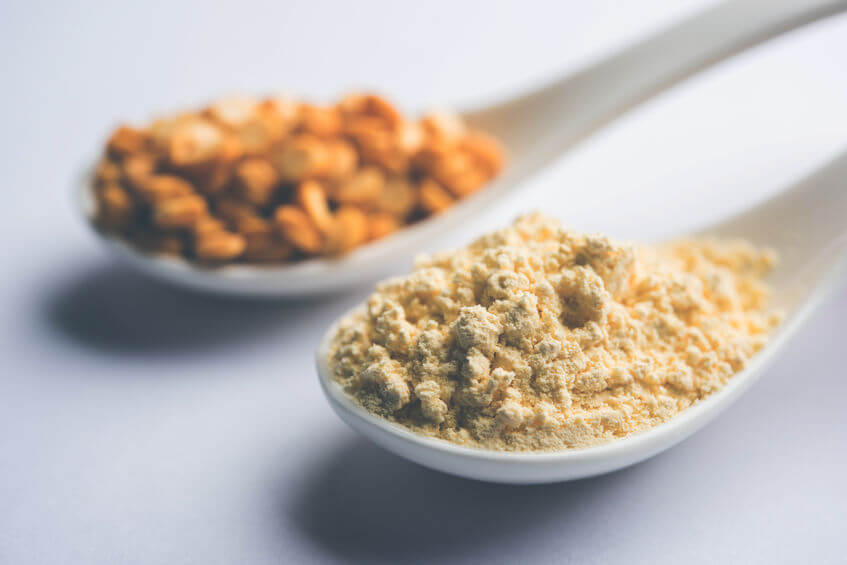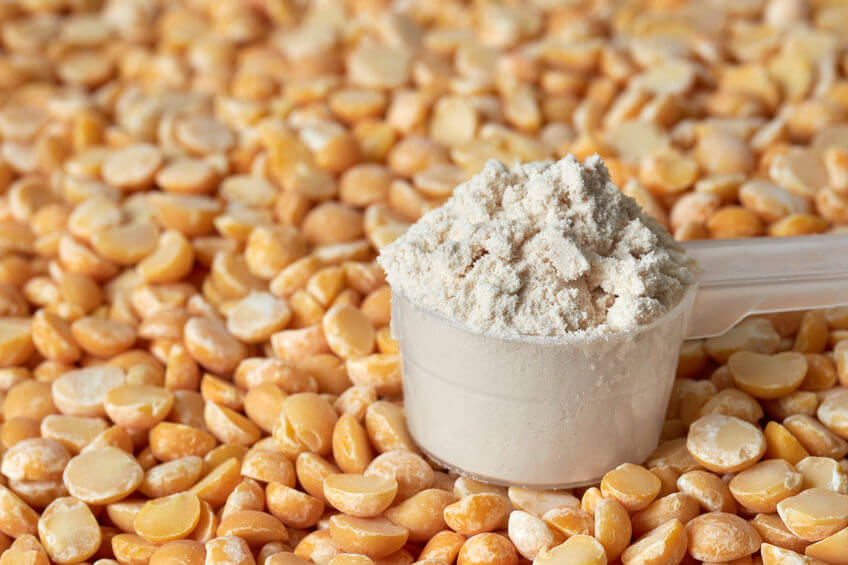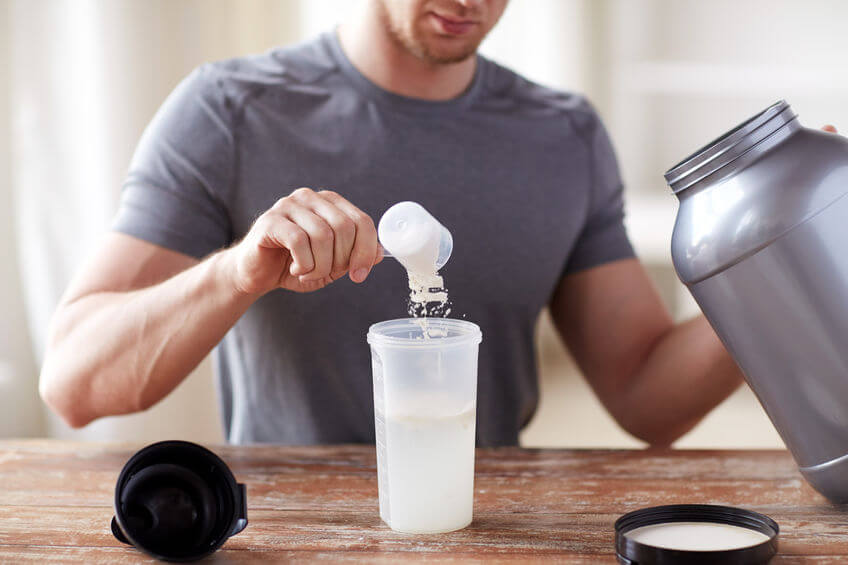Benefits of Pea Protein Powder: Why Pea is the Plant-Based Protein You Need
If you closely follow health news, you know just how exciting plant-proteins have become.
Despite being an animal protein-purist in the past, new findings have begun to convince me that proteins like pea protein might actually be just as good.
However:
Some plant proteins aren’t great choices, and knowing the benefits of each is vital for seeing results.
In this article:
I’ll help you better understand the various benefits of pea protein and show you why it’s the right choice if you’re looking for a plant-based protein supplement.
Contents
What is Pea Protein?
As you can probably guess, pea protein is a specific form of protein powder that comes from yellow peas.
Just as how whey protein comes from cow’s milk, manufacturers have been able to isolate the proteins found in these yellow peas and provide them in powdered form.
Now:
You might ask why peas would be the right source of protein?
Mostly, the answer depends on your preferences and dietary needs, but also the quality of your protein source.
First of all:
Protein supplements provide an effortless and convenient way to consume adequate daily protein. If you’re regularly exercising, using a protein supplement can help you eat enough protein to support muscle and strength gain.
Second, whey protein might not be the right choice for your body and preferences.
Despite being the gold standard in protein powder, whey and other milk proteins are, of course, derived from dairy.
As a result:
If you have an aversion to animal products, have a dairy allergy, or are lactose intolerant, whey or milk protein is probably not the right choice.
But there’s another issue…
Not all plant proteins are good choices.
Many plant proteins have poor amino acid profiles, and some of them are incomplete protein sources. These factors make them bad choices for building muscle and strength.
Whey, for example, is rich in almost all amino acids, like the one known as leucine.
Leucine is widely regarded as being required for promoting the process called protein synthesis, which is responsible for muscle growth.
Amazingly…
Pea protein is a close second to whey in terms of protein quality.
Research shows that pea protein not only has a complete and rich amino acid profile but also has high amounts of leucine.
These factors make pea protein arguably the best plant protein source you can find.
Since pea protein is such high quality, it provides a number of different benefits making it worth considering.
Just keep in mind:
It’s best to choose pea protein from a reputable brand to make sure that you’re getting a high-quality protein powder.
What Benefits Can Be Gained From Pea Protein?
Amazingly, there appear to be many different advantages and health benefits of pea protein, which make it worth considering even if you’re not on a plant-based diet.
Pea Protein Can Help Build Muscle And Strength
One of the main benefits of protein powder, in general, is that it provides a simple way to eat more protein.
Doing so can help maximize how much muscle and strength you gain from resistance training.
Now:
Most people, like me, assume whey protein is the best option available. However, research is showing us that pea protein might be just as good of a choice.
For example:
The first study to test pea protein and muscle growth recruited a large number of participants and exposed them to a 12-week resistance-training program.
Throughout these 12 weeks, the subjects consumed 50 grams of whey protein, pea protein, or placebo each day.
At different times throughout the study, these subjects had muscle size measured to see differences.
At the end of the study, they revealed that while both pea protein and whey provided significant muscle gains compared to placebo, there was no difference between subjects in either protein group in terms of benefits.
This suggests that pea protein was just as good as whey.
But that’s not all…
A second study used a similar protocol, providing 50 grams of pea or whey protein daily to athletes during an eight-week training program resembling CrossFit.
Similar to the first study, they too found no difference in strength or muscle growth when using whey or pea protein.
Mostly:
The current evidence suggests that pea protein will provide the same muscle and strength benefits as whey, making it a fantastic choice for plant-based athletes.
Personally, I’d recommend having pea protein alongside a proven pre-workout to maximize your response to training.
Pea Protein Can Help Control Food Intake
If you’re interested in losing weight or at least maintaining your weight, having control over the amount of food you eat is essential.
Even more:
If you care about your health, you’ll want to have better control when eating foods that are delicious, yet, high in calories, like pizza.
Amazingly, pea protein might be the answer.
In one fascinating study, subjects were given 20 grams of pea protein or a placebo and then provided with as much pizza as they desired.
At 30 minutes after protein or placebo, researchers measured the number of calories each participant consumed.
Guess what…
When participants had 20 grams of pea protein before pizza, those participants ate significantly fewer calories from pizza than the control group.
Even more:
Other participants were given 20 grams of fiber at the same time points, and even those subjects showed no significant difference in food intake.
This research suggests that consuming pea protein before high-calorie meals can possibly help you better control how many calories you eat.
In doing so:
Weight loss and weight management might be much easier.
Pea Protein Can Help Control Blood Glucose
If you’ve heard of insulin resistance, you know it’s a disorder that can ruin your health and physique.
Amazingly…
Pea protein might help.
When you eat foods like protein and carbohydrates, the amount of sugar in your blood rises. As a result, a hormone known as insulin is released from your pancreas to help lower the amount of sugar in your blood.
But:
If your blood glucose is always high, that means insulin is too. Overtime after being consistently elevated, insulin doesn’t work as well.
When this happens, you can develop what is known as insulin resistance, which often leads to weight gain and, in severe cases, type II diabetes.
While in these severe cases, insulin resistance requires medication, many people theorize that changing how blood glucose rises can be a simple way to overcome this issue.
Essentially:
By better-controlling levels of blood glucose, you’ll also possibly reduce the amount of insulin your body releases. In doing so, your sensitivity to insulin rises, which makes it more effective.
As an example:
Remember the study mentioned earlier providing pizza after consuming pea protein?
Well, those scientists also tested blood glucose responses in addition to calorie intake.
According to their findings:
When subjects had pea protein before their meal, their blood glucose response was drastically lower after eating pizza than compared to control.
Together:
These findings strongly suggest that pea protein can be a great way to not only manage food intake but also influence how your body metabolizes and uses that food.
Doing so could play a significant role in the prevention of disorders like insulin resistance and perhaps, help prevent severe metabolic issues down the road.
Pea Protein Might Have Anti-Inflammatory Properties
One of the more encouraging health benefits of pea protein is that ingesting it might have an anti-inflammatory effect.
Chronic inflammation is a serious health issue.
In fact:
Studies have linked different forms of inflammation to a myriad of disorders like depression, mental illness, obesity, and of course, pain.
Fascinatingly, researchers are beginning to investigate the potential anti-inflammatory effects of pea proteins, making them a smart choice for health.
In one interesting study, researchers tested pea protein hydrolysate on markers of inflammation.
Importantly:
A hydrolysate is essentially a pre-metabolized form of the original protein. Through a process known as hydrolysis, proteins break down into peptides and amino acids, which digest rapidly.
These researchers found that pea protein hydrolysates reduced markers of inflammation and inhibited pro-inflammatory molecules known as cytokines.
Keep in mind:
This study wasn’t explicitly testing ordinary pea protein powder but instead the proteins found in yellow peas – the type used to make pea protein.
However, the results are promising, and hopefully, future research will confirm these findings for standard pea protein powders as well.
Pea Protein Provides a Simple & Healthy Snack On the Go
Whether you’re about to hit the gym, chugging along at work, or simply in need of a snack, pea protein powder is a fantastic option.
For example:
While you can simply mix pea protein with water, you can also try mixing it with other ingredients to create a delicious shake. Even with a simple shaker cup!
My personal favorite:
- Protein
- Whole Milk (or Almond)
- Powdered Peanut Butter
- Cocoa
Best of all, since pea protein has minimal effect on blood glucose and provides a hefty dose of high-quality protein, it’s an excellent choice for any time of day.
Potential Side Effects of Pea Protein
Apart from possibly improving your chances of building muscle and promoting weight loss, there are few side effects to consider with pea protein.
In fact:
There are likely no more side effects of consuming pea protein than consuming whey.
The main concern with pea protein powder is the potential for gastrointestinal problems, including flatulence, if you’re not accustomed to higher amounts of protein in your diet.
Additionally…
Pea protein, along with other forms of protein, could result in kidney issues, but only if you already have malfunctioning kidneys and are consuming high amounts of protein each day.
Fortunately, research suggests this probably isn’t a problem if you have healthy kidney function.
Final Thoughts
Overall…
There are many different benefits of pea protein, solidifying its place in your supplement cabinet, especially if you consume a plant-based diet.
Research shows that pea protein is just as good as whey protein when it comes to building mass and strength.
Not to mention:
There appear to be other health benefits of pea protein, like helping you manage food intake, reducing blood glucose, and possibly even exerting an anti-inflammatory effect.
Mostly:
If you need a plant-based protein source, there are too many benefits of pea protein powder not to have it in your diet.
Now:
As a reminder, consider subscribing to our newsletter to learn more about the nutrition and exercise information you need to build your best body.






